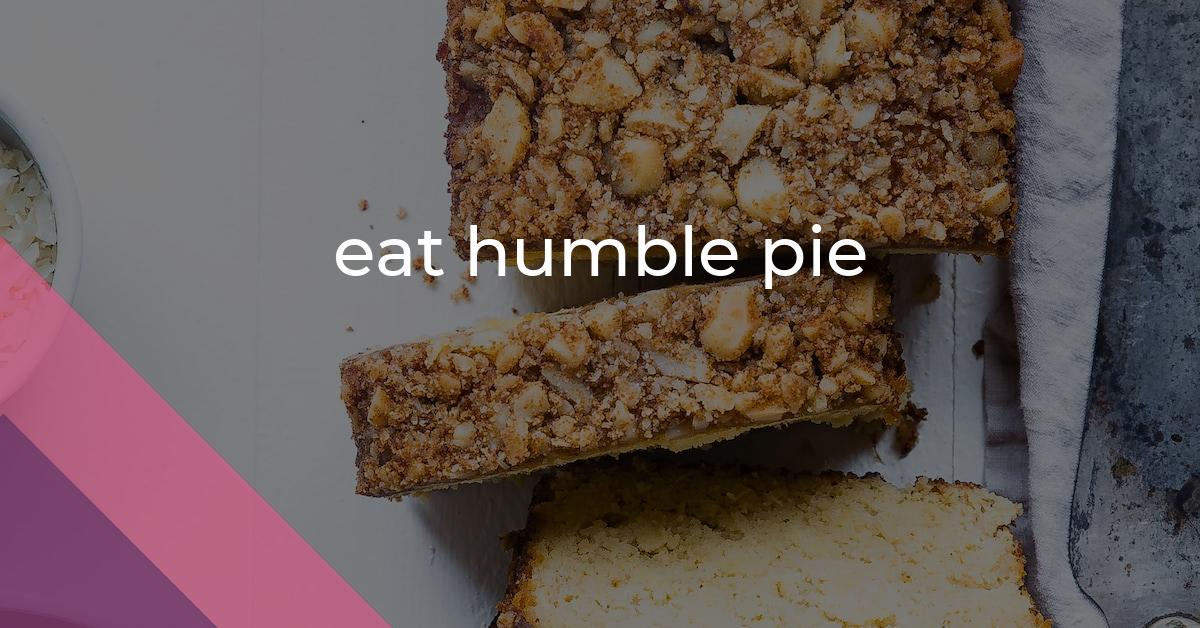eat humble pie: Idiom Meaning and Origin
What does ‘eat humble pie’ mean?
The idiom "eat humble pie" means to apologize or admit one's mistake in a humble and sincere manner.

Idiom Explorer
The idiom 'humble pie' means a person's acknowledgment of their mistake or humiliation, often with a sense of humility and remorse.
The idiom "hat in hand" means to be humble or submissive, often after a failure or when seeking forgiveness or help.
The idiom "get off one's high horse" means to stop behaving arrogantly or condescendingly and to become more humble or down-to-earth.
The idiom "fall on one's sword" is used to describe taking responsibility for a mistake or failure, often by sacrificing oneself or accepting blame.
The idiom "fall on one's face" means to fail or make a mistake in a very obvious or embarrassing way.
The idiom "eat one's feelings" means to cope with emotions or stress by indulging in comfort food or excessive eating, as a way of temporarily relieving emotional pain or distress.
The idiom "eat it" means to accept or tolerate something unpleasant or embarrassing, often with resignation or humility.
The idiom "eat dirt" means to suffer a humiliating defeat or to be forced to submit to someone. It is a figurative expression that implies being in a position of inferiority or having to endure a humiliating situation.
The idiom "eat crow" means to admit a mistake or defeat and accept the consequences, often with humility and embarrassment.
The idiom "eat an elephant one bite at a time" means tackling a large or overwhelming task by breaking it down into smaller, more manageable parts.
Humbling Oneself through Pastry
The idiom "eat humble pie" is related to several other idioms with similar meanings. One such idiom is "humble pie," which is directly connected to the origins of "eat humble pie." Another related idiom is "eat crow," and yet another is "eat it." Each of these idioms conveys the idea of being humbled, admitting one's mistakes, and showing humility. They are all used to describe situations in which a person is forced to lower their pride and face the consequences of their actions.
The term "humble pie" originated in medieval England, where pies were a common and popular dish. There was a specific type of pie known as a "umble pie," which was made from the internal organs and entrails of an animal. The term "umble" eventually evolved into "humble," and the pie became associated with simplicity and frugality. Eating humble pie was often a way for people of lower status to demonstrate their humility and adherence to social norms.
The idiom "eat humble pie" emerged over time, drawing upon the associations of the traditional humble pie and its connotations of humility. It became a metaphorical expression used to describe situations where a person had to admit their mistakes and show humility or remorse. The idiom emphasizes the person's humiliation or loss of status, highlighting the contrast between their former pride and their current humbled state.
The idiom "eat crow" is similar to "eat humble pie" in meaning. It also conveys the idea of being humiliated and admitting one's mistakes. The origin of this idiom is unclear, but it is thought to have originated in America in the 19th century. It is believed to have derived from the behavior of crows, which are known for being intelligent and cunning birds. Eating crow was considered a humbling experience, reflecting the shame and humility that comes with admitting one's errors.
The idiom "eat it" is another expression that shares a similar meaning to "eat humble pie" and "eat crow." It is often used informally to describe situations where a person has to accept the consequences of their actions or admit defeat. The phrase "eat it" is a shortened form of "eat your words," which originated in the early 19th century. The expression "eat your words" refers to the act of retracting something one has said and acknowledging that it was incorrect or inappropriate. It is a way of showing humility and recognizing one's own fallibility.
The idiom "eat humble pie" is a widely recognized expression in the English language. Its origins can be traced back to medieval times in England, where the term "umble pie" referred to a low-quality pie made from the internal organs of an animal. Over time, the idiom "eat humble pie" emerged, metaphorically describing situations where a person is humbled, admits their mistakes, and shows humility. It is related to other idioms such as "humble pie," "eat crow," and "eat it," all of which convey similar meanings of being humbled and admitting one's errors. These idioms remain culturally relevant and continue to be used in both formal and informal contexts.
Example usage
Examples of how the idiom "eat humble pie" can be used in a sentence:
- After boasting about their team's chances, they were forced to eat humble pie when they lost the match.
- She thought she knew everything about the topic, but she had to eat humble pie when her boss corrected her mistake in front of everyone.
- He used to belittle others' achievements, but now he is eating humble pie as he struggles to succeed in his own endeavors.
More "Apologies" idioms



